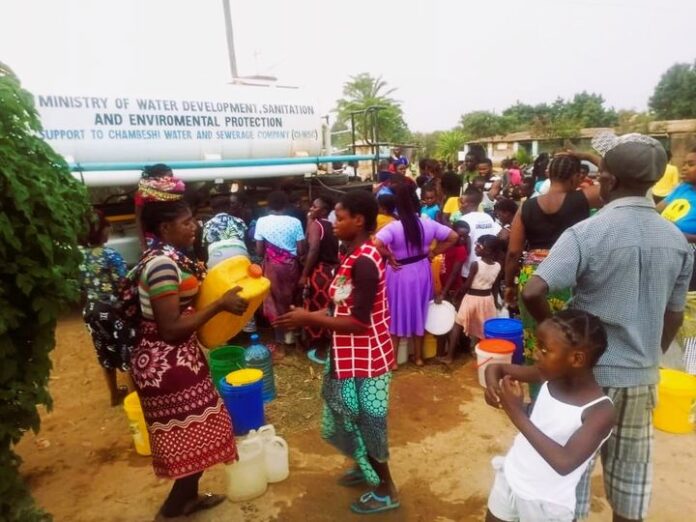By Angela Mtambo & Charles Mafa
Initiated in 2017 with the aim of improving water supply in several towns across the northern regions, including Muchinga, Luapula, and Western Provinces, the project, funded by a loan from the African Development Bank (ADB), has unexpectedly resulted in increased and persistent water shortages in Kasama town, as reported by local residents.
Voices from the Community
In the heart of Chiba Township, within Kasama, and in nearby areas such as Airport and Newtown, residents like Melody Bwalya, a 30-year-old married mother of three, are grappling with a chronic shortage of water, despite their homes being connected to the new water project.
Bwalya, who earns her livelihood by selling vegetables and occasionally taking on piecework washing clothes, has called Chiba home for over three years now.
During this time, one of the most challenging issues faced by her community has been the persistent problem of water scarcity. However, a glimmer of hope arose when she learned about the Chambeshi Water Supply and Sanitation Company’s project aimed at addressing the water shortage in the district.
“We eagerly awaited the project’s completion,” she said.
She mentioned that, upon the successful completion of the project, they enjoyed a consistent and clean water supply that ran continuously for three months during the test period.
However, their elation was short-lived when it was announced that each home had to pay K950 Kwacha for water connection.
While some families managed to afford this fee and promptly had meters installed, their expectations were dashed when the reality fell far short of their hopes.
“Despite the majority of us having paid and meters in place, water delivery became erratic, with supplies available only three times a week,” she expressed. “Frequently, water was delivered at inconvenient times when we couldn’t access it.”
In Bwalya’s case, her six-year-old daughter’s frequent illnesses require regular trips to the hospital, making access to water even more challenging.
Moreover, this issue isn’t unique to Chiba alone. In other areas like Newtown and Location, where Bwalya often takes on washing piecework, the situation is remarkably similar.
Bwalya, along with many others in the community, has had to invest in water storage containers just to survive. However, given their modest living standards, most of them simply cannot afford such a luxury.
“What’s particularly disheartening is that we initially believed this issue was limited to our community, but it appears to be a shared challenge in many households,” Bwalya lamented. “Those of us who have paid the K950 for water connection find ourselves in a situation where we can’t access this essential resource every day, despite our sacrifices to make this payment.”
Kuseka’s Ongoing Water Challenges in Airport Township
Residing in Airport Township, Maybin Kuseka is a married businessman with a decade-long history in the area. Regrettably, throughout his entire tenure here, the persistent issue of water shortages has cast a shadow over his experience.
Initially, Kuseka held hope when he learned about Chambashi’s plans for a water project in the area. He willingly paid the required fees, anticipating that this investment would ensure a safe and clean water supply for the community.
To his satisfaction, several homes began receiving water as part of the test supply. However, despite fulfilling all the necessary payments and meeting the requirements, nothing has changed for Kuseka. He continues to be without access to clean water, both during the test supply period and up to the present.
Frustratingly, Kuseka’s numerous reports to Chambashi Water have yielded no concrete solutions. Weary and perplexed, he now questions the reasons behind this inconsistency.
Kaluku’s Struggle for Reliable Water Supply in Newtown
Kingsley Kaluku resides in Newtown and is currently in the process of building a house in Airport Township.
The enduring water issue in the area has plagued him for as long as he can recollect, spanning the entire duration of his house construction project, which he successfully completed this year. During this period, he had to rely on water borrowed from a neighbour who had a pump to supply water.
However, even after completing the construction and meeting all the necessary payments and requirements, Kaluku’s primary concern lies in his current residence in Newtown. Since his relocation there in 2001, they have been grappling with chronic water shortages.
Upon learning about the ADB-funded water project in Kasama, Kaluku glimpsed a ray of hope. He promptly took all the required actions, including paying theK950 fee and installing a standing tap. However, despite these diligent efforts, water still fails to flow from his taps.
The presence of a water-borne toilet in his home serves little to no purpose due to the severe scarcity of water.
As a concerned member of the community, Kaluku, along with his neighbours, has reported this problem to Chambashi Water on multiple occasions. Unfortunately, these efforts have yet to yield any concrete solutions.
Despite repeated promises from the company, residents find themselves in a frustrating predicament, as these assurances have not been honoured.
Mwaba’s Concerns in Location: A Billing Enigma and Inconsistent Water Supply
Residing in Location, Emeldah Mwaba grapples with a baffling issue – the absence of water bills. During the initial testing phase, it appeared that water was provided free of charge, only for residents to be taken aback when bills started arriving.
A disconcerting silence surrounds the billing front, stretching from June until now, which raises concerns.
Mwaba finds herself in a dilemma, pondering the possibility of making a preemptive payment out of fear that an impending bill could be substantial, potentially exceeding their means. The uncertainty regarding the impending financial burden is a source of genuine worry.
While there has been some water supply, it falls short of the expected consistency. Mwaba and her fellow residents express profound disappointment, as the current service they are receiving doesn’t align with their initial expectations.
Click here for our comprehensive coverage, including the responses from the company and government.

Discover more from MAKANDAY
Subscribe to get the latest posts sent to your email.



